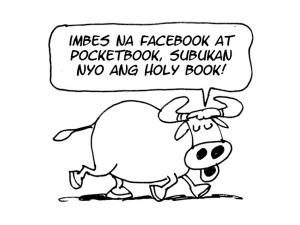
In this predominantly Catholic country, the Bible is not only facing stiff competition from romance pocketbooks, horoscopes, feng shui (Chinese geomancy), it also is facing the challenge of the Internet, an official of the Philippine Bible Society (PBS) said Tuesday.
Romance pocketbooks are popular among women while the young patronize more Internet shops instead of reading and reflecting on the Bible, said PBS general secretary Nora Lucero.
She added that a PBS study in 2011 also showed that 55 percent of Filipinos did not have their own copy of the Bible.
Many distractions
“There are many [distractions]. It’s not just [horoscopes and feng shui books] because there are pocketbooks that are like telenovelas while the young spend more time in the Internet cafes,” Lucero said at a Church forum in Intramuros, Manila.
The Internet is becoming the main competitor of the Bible as Filipinos spend more and more time on online games and social networking sites, she said.
Pampanga Auxiliary Bishop Pablo David has maintained that “all the activities in the life of the Church should be animated by the Bible,” Lucero said.
“Sometimes, the Church has many programs that are not linked to the Bible so it is really a great help if the Church itself should push for Bible reading,” she added.
To increase Bible literacy among Filipinos, the PBS, which includes the Catholic Church and Protestant churches, launched a program in 2009 to distribute 5 million Bibles in five years. So far, they have been able to distribute 800,000 Bibles.
Funding needed
“We are now trying to do more and are not looking at a five-year schedule because we also face other challenges like values formation and funding (Bible production),” Lucero said.
The printing cost for one Bible is P150, but the PBS sells its copies for only P50 each.
“So we have to raise funds for the P100 difference. We do that locally and internationally because there are also other Bible societies like us,” Lucero said.
Audio, e-Bible
To neutralize the challenge posed by the Internet, the PBS has also produced an audio Bible and an e-Bible that can be downloaded online.
“We made the e-Bible available two or three years ago, while the audio Bible can be downloaded from the Internet,” Lucero said.
Despite the challenges, Lucero said their project was successful as the percentage of Filipinos with no Bibles had gone down from 60 percent in 2005 to 55 percent in 2011.
“We have touched several millions because, from 60 percent, it’s now down to 55 percent. Hopefully, this is a dent and there would be a continuing interest in the word of God,” she added.